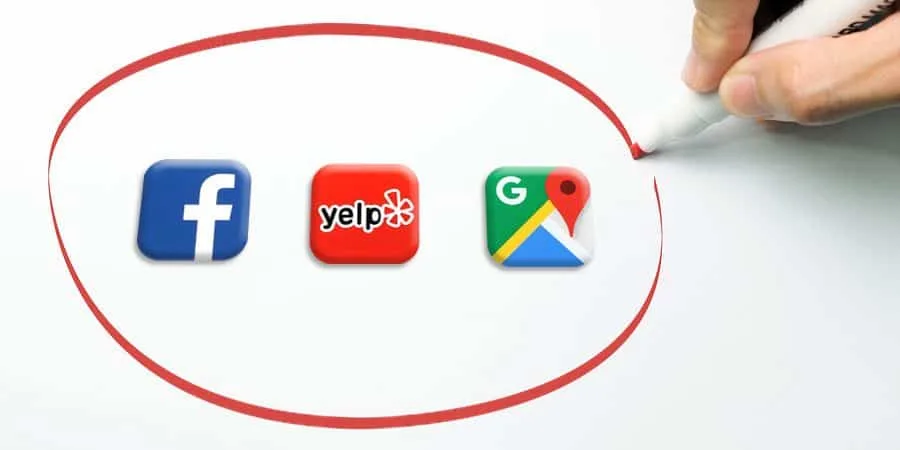If you’re serious about developing an online reputation strategy, you’ll need to decide which review platforms to focus on early in the process.
You don’t want to send clients review requests with a dozen links. Giving them too many options can actually result in fewer reviews. You’ll also find it difficult to measure your work if you’re trying to get reviews on dozens of platforms.
Focusing your efforts matters, but you may not know where to start. In this guide, you’ll learn how to choose review sites, get a briefing on all the top platforms, and discover the niche ones that can make a serious difference.
Key Takeaways
- There are even more niche review sites that you should know about if you work in certain industries. You’ll learn about some niche platforms you shouldn’t ignore.
- The best review platforms are those that most closely match your customers and niche. You’ll learn about the decision-making process you should follow to choose your review platforms.
- The top online review platforms are a great place to start. You’ll learn about the qualities of some of these top sites and whether they’re good for you.
What Makes a Good Online Review Site?

Selecting the right review sites is crucial for managing your online reputation and attracting potential customers. Here are some factors to consider when evaluating the sites you’ll choose.
Mainstream relevance
Review sites typically set reasonable guidelines on what sort of customer review content they accept. Sticking to mainstream review platforms with reasonable review content standards is beneficial for your business and makes sense.
Industry Relevance
You should choose platforms that cater to your industry or niche, as this will ensure that your reviews reach the right audience when they are posted. This is especially important if you’re trying to promote reviews as part of a reputation management strategy.
Target Audience
When determining which sites to focus on, a crucial factor is how familiar your audience is with them. Many customers don’t trust online review sites they’re unfamiliar with, so developing a presence on review sites that your clients aren’t utilizing is a pointless effort.
Instead, focus on the sites that provide the most significant benefit, such as Google, Facebook, and Yelp. Most smartphone users have access to the apps for at least one of these three sites, and those with the apps installed are almost always already signed in, which makes it incredibly easy for them to write a review.
Review Volume
Opt for platforms with a high volume of reviews to increase visibility. More reviews can enhance your business’s credibility.
Ease of Use
Customers typically avoid exploring review sites, so you need to make the whole process as simple as possible. A great deal of the review depends on the type of user experience a review site offers; the small and niche options often have a sluggish or confusing user experience.
When choosing the review sites most appropriate for your marketing approach, put yourself in the customer’s shoes. Check if the review platform makes writing and posting a review simple.
Cost
Consider any expenses associated with using the platform, including paid features or services. Ensure that the benefits outweigh the costs.
By selecting the right review platforms, you can attract potential customers, build trust, and drive sales for your local business. You’ll want to get started with one of the platforms you’ll learn about next.
The Top Most Popular Review Platforms for Businesses

The following review sites are some of the highest-quality and highly trafficked sites on the internet. You’ll learn a little about each to better understand whether they fit your needs. When you finish this list, you’ll learn more about some specialized ones.
| Google is undoubtedly a leader in all things web, including reviews. Your Google Business Profile (aka Google My Business) is a vital information source for millions of online users. You get every business’s contact information and operating hours at your fingertips, plus the Google reviews come in pretty handy, too. Google reviews are crucial for a business’s reputation. They’re easy for potential customers to find and minimize any uncertainty about the business. Needless to say, Google is the most popular search engine, and as more and more people use it to make local searches each day, more local businesses are competing for top rankings and more Google reviews… because reviews help businesses rank better. Google doesn’t provide public information about the number of reviews its users post. However, keep two things in mind: anyone with access to Google can read reviews posted on an organization’s Google Business page, and Google hasn’t dipped lower than 90% of the entire global market share of search since 2015. Translation: almost everyone in your customer base has access to Google reviews written about your business. | |
| Yelp | Yelp is a website and app that publishes reviews for local businesses. It also offers small companies training on how to respond to negative reviews, hosts social events for Yelpers (also known as Yelp reviewers), and provides useful statistics on businesses, such as health inspection scores. Yelp used to be the most important review site, and while its market share has waned over the past decade, it’s still a major player in the space and shouldn’t be ignored. Yelp reports that it averages over 178 million unique visitors across all platforms every month. It also generates 28 million new users on its app every month. Between the site’s launch in 2004 and the end of 2022, Yelp users wrote 244 million reviews. |
| Facebook reviews are important regardless of your business type. Facebook had over three billion monthly active users at the end of 2024. Anyone with a Facebook account can view reviews posted on the site; over a third of the world’s population actively uses Facebook. On Facebook, users may create profiles, post photos and videos, send messages, and keep in touch with friends and family while following their favorite businesses and brands. Companies can develop business profiles that consumers can follow and rate depending on their interactions with the company. | |
| Trustpilot | Trustpilot is a go-to platform for e-commerce and service-based businesses. It allows customers to leave detailed reviews and ratings, which helps businesses in these sectors showcase their reliability and customer satisfaction. |
| BBB | Historically, the Better Business Bureau (BBB) was an organization dedicated to advancing marketplace trust. In many ways, the BBB was the original “review site”, and its primary function these days is operating as a review site. With over 12 million visitors each month, the BBB website is still a significant platform for local businesses to manage their online reputation. The Better Business Bureau (BBB) provides an online platform for customers to file complaints about businesses and for businesses to address the concerns raised. A high BBB rating signals trustworthiness and integrity. Companies prioritize maintaining a good BBB standing as it directly impacts their reputation and credibility. Resolving complaints and fostering transparency remain key when engaging on the BBB platform. |
| Angi | Angi, formerly Angie’s List, has become a trusted platform for reviewing home service providers. Consumers look to Angi for recommendations on contractors, plumbers, and other home service professionals. Service providers benefit from showcasing their skills and receiving endorsements on Angi. Active participation in the platform and receiving positive feedback on Angi aid businesses in acquiring new clientele. |
| TripAdvisor | TripAdvisor is a dominant force for hotels, restaurants, and attractions. Travelers and tourists rely on TripAdvisor reviews before making reservations and while planning trips. The platform provides detailed feedback on user experiences, making it invaluable for hospitality businesses. Engaging with customers on TripAdvisor offers businesses a chance to improve their services based on genuine feedback. TripAdvisor started in 2000, and has since become the internet’s choice for hotel and restaurant reviews, now boasting over one billion reviews. On TripAdvisor, customers can review businesses and rate them out of 5 stars, as well as rate reviews as “Helpful”. Reviews can also be filtered in various ways: by “traveler type”, review date, and keywords mentioned in the reviews. Customers can even use their Google accounts to sign up to Tripadvisor, making it an accessible review platform since Gmail, Google’s email client, has more than 1.8 billion active users worldwide. TripAdvisor reviews are largely viewed as credible and trustworthy. Users must have an account to write reviews, and TripAdvisor assesses all reviews for review fraud before they get posted. For businesses in the travel, tourism, and hospitality industry, Tripadvisor is a platform that shouldn’t be ignored. Along with being a frequently high-ranking site on Google, businesses can be numerically ranked on TripAdvisor as one of the top businesses in their area. By getting reviews on Tripadvisor, you can boost your business’s visibility and authority, drawing more customers to your business organically. |
At least a few of these sites should be valuable for your reputation management strategy. If you are in certain niches, the sites in the next section may better fit your needs.
Niche and Industry-Specific Review Sites You Should Know

| Amazon | Amazon is full of product reviews for e-commerce businesses. Buyers trust the feedback of other customers on Amazon before making purchase decisions. Product rankings on Amazon determine their sales performance. It’s imperative for sellers to encourage positive reviews and address any concerns raised by customers. |
| Glassdoor | Glassdoor gives employees a voice, while most review platforms focus on customer feedback. Companies receive reviews from current and past employees, offering insights into workplace culture and benefits. Potential employees look to Glassdoor before accepting job offers. Companies must recognize the importance of their image on Glassdoor and work towards creating a positive workplace environment. |
| Manta | Manta offers small businesses a platform to gain visibility and receive reviews. Manta focuses on promoting local companies and driving local customers to such businesses. Positive reviews on Manta enhance the image of small businesses and contribute to their growth. Engaging with the community on Manta is a valuable strategy for small establishments. |
| Capterra | Capterra is the dominant force in the world of software and B2B solutions. Companies looking for software solutions rely on Capterra’s user reviews to guide their decisions. Software providers benefit from showcasing their products and receiving feedback on Capterra. Active monitoring of reviews and feedback on Capterra helps software companies refine their offerings and address any issues users face. |
You may need even more specialized sites if you work in some niches. The table below may help you begin the next part of your search.
| Lawyers | Doctors | Restaurants | Service Providers |
| Avvo Lawyers.com | Healthgrades RealSelf ZocDoc | Zomato TripAdvisor | Angi (formerly AngiesList) HomeAdvisor DealerRater |
By now, you have a pretty good idea of what review platforms to explore, but you may still not be sure of how to get started on them. The next step may be as easy as finding a review management software to automate most of the work.rful.
Start Getting More Reviews on Every Platform with ReputationStacker

With so many online review sites, it can be challenging for a business to know which ones matter. The big three review sites (Google, Facebook, and Yelp) are the most popular and influential sites, but it’s important not to ignore any niche sites that cater to your industry.
A stellar reputation on one review website can be overshadowed by another site where your business has a low number of reviews, negative reviews, false reviews, or no responses to customers.
This makes managing your reviews (your reputation) on multiple platforms important.
The good news is that establishing a reputation on the major review platforms is enough to build trust with customers.
If your business isn’t travel-based, you can check off TripAdvisor, leaving only Google, Facebook, and Yelp. Still, managing multiple review platforms to build your online reputation can seem like a steep hill to climb.
Once you’ve figured out where you want your customers to write reviews, get them working for you using an automated system like ReputationStacker, and take the work out of getting more positive reviews from your customers.

